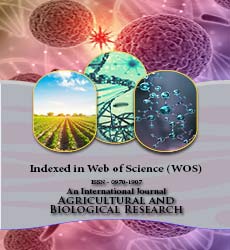Agricultural and Biological Research
RNI # 24/103/2012-R1
Chikaire JU*, Godson-Ibeji CC and Ogueri EI
The study examined rural intervention programmes for meeting the energy and agri-food needs of smallholder farmers in Imo State, Nigeria. The specific objectives were to identify energy sources available to farmers in the study area; examine energy and agri-food needs of respondents and ascertain perceived rural interventions for meeting the energy and agri-food needs of respondents in the study area. A total of 360 smallholder farmers were selected and interviewed. Data were collected with a structured questionnaire and analyzed using percentages and mean. The available energy sources include human power (100%), mechanical power (70.5%), electrical power (66.6%), candles and kerosene (81.6%), charcoal/wood residues (78.8%). Energy is needed for cooking/preparing food (100%), crop production (100%), processing (88.5%) and the agri-food needs were to improve farmer livelihoods (66.6%), increase crop productivity (89.1%), reduction poverty (88.8%) among others. Rural interventions for meeting energy and agri-food needs included rural electrification programmes (M=4.09), standalone off grid energy solution (M=3.91), agricultural mechanization (M=4.05), rural road/transport programmes (M=3.90) and training/retraining of both farmers and extension officers with mean of 4.08 and 3.41 respectively. Improved/clean energy facilities are provided to the rural populace by the relevant stakeholders–governments, donor agencies, NGOs, etc. for improved livelihood and food security.
